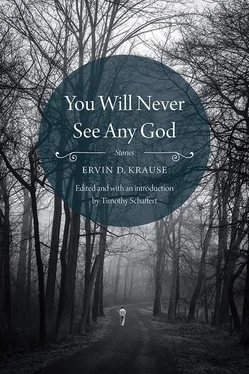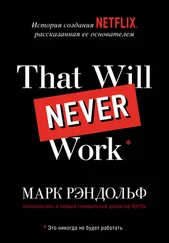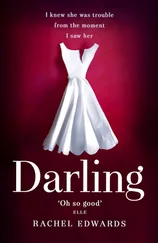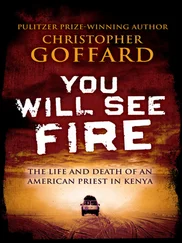“You’re Ezra Stark,” the father said.
They both — the boy and the father — watched the lips of Ezra Stark to see if they were alive, if the purple face and the drooping red-bordered eye were something living or dead.
“Yes,” Stark said, his lips hardly moving, and he looked at the boy, but the boy did not notice the eyes; he only saw the inflamed worm-lavender cheek and the sagging corner of the raw mouth.
“I was over to your place the other day,” the father said. “But there was nobody home.”
“I must have been in the field,” Stark said. There was a faint lisp in his voice, a faint struggle to form words and speak. He spoke very slowly, and his voice was deep.
“We’re just putting up the fence,” the father went on. “My cows busted out.”
“I seen the oats field,” Stark said. He looked at the gawking boy again, studied the boy’s face a moment and looked away, at the old man again. The father noticed the boy then, too.
“What you looking at, boy?” he said. “You never seen a stranger before? You can finish up this post — that’ll give you something to do while men talk.”
The boy knelt obediently and pushed dirt into the black half-moon and tamped the clods, crushing them, sealing the post in.
The boy felt a shudder — it was not the air and the wisps of drizzle. He knew what it was — there was evil here. He had a swift recognition of the evil of something warped, the terror of darkness and the strange; he had felt it before, on cold lightning-fired nights, in the chill of the church on Sunday mornings, on entering an unlighted barn. This had always held a secret terror for him, for he went much to Sunday school and church, and he had heard much of evil, had known it to be rampant and secret, and it had always been hidden secretly from him, behind bannisters on stairs, in the darkness of doorways at church, behind corners cringing in barns, in the dank, tree-overhung lagoons that were nursed with bad water and a stench down along the river. It had always been a secret terror for him before, but now it was here, very near to him; he could look up and see the heavy, mudded shoetops of the neighbor with that face strange, carved as if from red and rotted wood with the purple, bloodless leer and the red-rimmed, gouged eye.
The boy breathed quickly, not so much from the work, placing the post, as from the quick fear and hot, nerve-catching fascination of being so near to that which he had feared and had always wanted to see, face to face, all his life, but had never seen until now.
The boy moved his slight shoulders and patted the earth, smoothing it carefully around the post. He knelt and looked from beneath his blue cap bill at Stark, at the man with the hideous evil face. He wondered what the man thought, if there were evil thoughts, plans, sweeping through him, like spiders crawling inside that reddened skull, and if the spiders too had that cold and dead and bloodless purple look, like rotted plums. He thought of it and felt the sudden fascination and hatred come over him again. He was afraid to look at the man’s face, looking instead at the heavy mud-laden shoes, hearing the voices of his father and Stark speak from a distance.
His father did most of the talking; he was always one for that, never missing an opportunity to visit even if no one else wanted to talk, as they did not want to around this, their new place. His father talked of oats and went to scrabble in the wet dirt to look for seed that hadn’t sprouted, and the man, Stark, followed him, and stood in half-crouched posture, bent from the waist, as if he were hardly interested in what the father did. The boy watched him now, watched with a calm intensity, expecting the man to do something, violent and sudden, and if he did the boy knew what he would do; he would spring to the aid of his father in that struggle, he would swing the long steel bar, he saw it now — the swift, crushing, sodden violence, and the fine muscles in his arms grew rigid in preparation, but the man did not do anything at all.
The man, Stark, went away then, down the long slope towards the shack and the outbuildings partly hidden by trees, partly by the hills, moving with heavy, mud-laden feet, pulling up the oats turf worse than any cow had done.
“He has a bad scar,” the father said to the boy. They went to the next post, and the father dug the spade in and turned the earth out, preparing to make the hole.
“What did he get it from? Did he always have it?” the boy asked.
“It’s a birthmark,” the father said. “He never goes anyplace because of it. I’m surprised he came up here to talk to us today.”
“He probably had a reason,” the boy said, with faint insinuation.
“What reason?” the father asked, gasping with the work of the auger. “Oh, the cows — no, he wasn’t mad about that. He didn’t even mention it.”
The boy listened to his father and knew the old man did not understand as he understood.

The boy could move like a shadow or like smoke, noiseless and swift, more often not moving at all, standing silent, blending in with where he stood. He had learned it hunting with his father, had learned to stalk rabbits and squirrels and an occasional rare deer, moving as silent as smoke through the woods, blending by his careful tenseness into the trees and the corn. Sometime when he was younger — it was on another farm, another time — he had recognized his ability to be silent, to tread with smoke softness, and he could come nearly to neighbors’ yards and there he squatted and watched and listened and when he was satisfied he drifted off again. He was quiet, the boy; he told no one of what he did or what he had seen or heard — he knew much, for he heard many of the intimate and violent man-and-wife arguments of his neighbors — knew more than the neighbors would ever admit aloud, and no one ever questioned him. There were six in the family and he was the third, and they were all too busy to notice him except when they needed him for work or chores — milking or egg gathering. The boy helped with the chores on summer evenings, milking down in the hot, fly-infested barn, and then, later, he sat in the wooden chair by the yellow kerosene lamp in what was called the living room, although the only thing that made it different from the kitchen was that it had no stove and dinner table, and there he dutifully did his catechism work. He was to be confirmed in the church in the spring, and it was important that he know his lessons of devoutness and godliness, and his mother listened to him recite before he could go out again.
The summer nights were thick with hotness and liquid heaviness, giving the evening a warm, oily texture like warm bacon grease, airless in the hollows between the hills where the corn grew lush and tall, crowded with the small, intimate sounds of locusts and crickets, sounds that mixed and settled in the hot, pollen-laden air, but jarred somehow by the strangeness and loudness of human voices and the slamming of doors far away. The evenings lingered, dusty and quiet and warm, lingered in a dusty lethargy, like a fat and squashed too-ripe pear silked over with dust.
The boy moved then, after his Bible history and catechism lessons, drifted like smoke across the barbed fence, hardly raising a sound, and across the road to the other fence and was submerged in the cornfield. He followed the corn row down the hill, moving with alacrity and swiftness and utter stillness, with less sound than the bees above the cornfield or the rustle of the blue-green bayonet leaves themselves, which no one ever hears consciously, and he stepped carefully from foxtail clump to clump, so that there were only a few random footprints in the dirt.
Читать дальше












